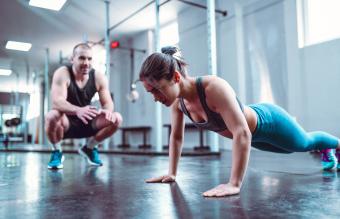
The branding for sports drinks feature some of the world's most elite athletes in the world. While you may want to be able to dunk like an NBA star, a sports drink won't help you achieve that goal. Frankly, sports drinks are most beneficial to athletes or those who train like athletes.
Skip the Sports Drinks
Wellness Coach and Certified Holistic Health Educator for Kaiser Permanente Sylvia Nalezny says, "In my opinion, sports drinks are over-marketed and full of additives that are more harmful than good."
A typical sports drink contains three key components: sugar (carbohydrates), calories and sodium. Take Powerade, for example:
- 50 calories per serving (an eight ounce bottle is 2.5 servings)
- 100 mg sodium
- 14 grams of sugar
- 14 grams of carbohydrates
A sports drink that has 150 calories means it's comprised of roughly 10 teaspoons of sugar. If you are health conscious, you'll want to think twice about any beverage that has that much sugar.
Added Sodium
On average, a sports drink will add 100 mg of sodium to your diet. While some sodium intake is important because it will replace that which you lose during exercise from perspiration, be careful. If you are like most Americans and consume 3,000 mg of sodium daily, that puts you well over the recommended limit. According to the Mayo Clinic, The Dietary Guidelines for Americans says you should consume no more than 2,300 of sodium mg a day.
Basically, you can pass on the sports drinks. There's no need to down one after your Zumba class or power walk. The same applies to children. Sports drinks can be beneficial for young athletes who participate in prolonged, vigorous physical activities, but typically they are unnecessary on the sports field or in the school cafeteria, as explained by the American Association of Pediatrics.
When to Consider Sports Drinks
Sports drinks are best for athletes or those training like athletes and really pushing their limits. These drinks are designed to help the body achieve optimal performance during physical exertion. They give the body that extra carbohydrate boost and refuel you to meet the physical demands of strenuous exercise. It is extremely difficult for an endurance athlete's body to function properly in the absence of essential carbohydrates.
Nalezny explains, "If you're exercising intensely for more than an hour per day, you may consider adding electrolytes back in." You might consider a sports drink if you are:
- Engaging in intense workouts that will last more than an hour
- Working out in extremely hot or humid conditions
- Prone to sweat profusely
- Prone to muscle cramps
What to Drink
It's no secret that dehydration can spoil a good workout and even put your health at risk. Harvard Health Publications pulls no punches when it comes to the best choice for hydration; water was the hands down favorite. Before there were sports drinks, water was the drink of choice. Most experts agree that for the majority of us, water is still the best bet.
You can also get fluid from the foods you eat, explains the Center for Disease Control (CDC).
Nalezny suggests, "While it's true that we do lose electrolytes during exercise, usually if you're eating a well balanced diet, using quality sea salt, and eating an abundance of organic produce, chances are you're probably going to be fine."
Other Hydration Options
Nalezny says "You can make your own sports drink with fresh lemon juice, maple syrup and sea salt, and maybe a little fresh coconut water." It's actually quite easy to make your own tasty electrolyte drink. If you feel water isn't enough or you just want to try something different to fuel your workouts and keep you hydrated, make your own healthy drink.
Identify Your Hydration Needs
For most of us obeying our thirst is the best rule of thumb. Children and the elderly may need help in gauging their need to hydrate, as pointed out by the British Medical Journal (BMJ) in its 2012 study on sports drinks. Furthermore, if you're judging hydration based on your urine color, you should do it first thing in the morning. The BMJ study found that this commonly used method of gauging hydration isn't always as reliable as you think. The study states that "the limited evidence shows that only first morning urine colour can be reliably used to assess dehydration and rehydration."
The American Council on Exercise gives the following hydration pointers:
- Drink 17-20 ounces of water 2-3 hours before exercise.
- Drink eight ounces of fluids 20 to 30 minutes prior to exercise of during warm up.
- Drink 7-10 ounces of fluids every 10 to 20 minutes of exercise.
- Drink another 8 ounces of fluids within 30 minutes of exercising.
- Drink 16-24 ounces of fluid for every pound of body weight loss after exercise.
Drink Up
It's obvious that you should make sure that you're well hydrated for exercise. Water, however, will do the trick. So do yourself a favor and avoid the extra calories and sugar that sports drinks have to offer.







